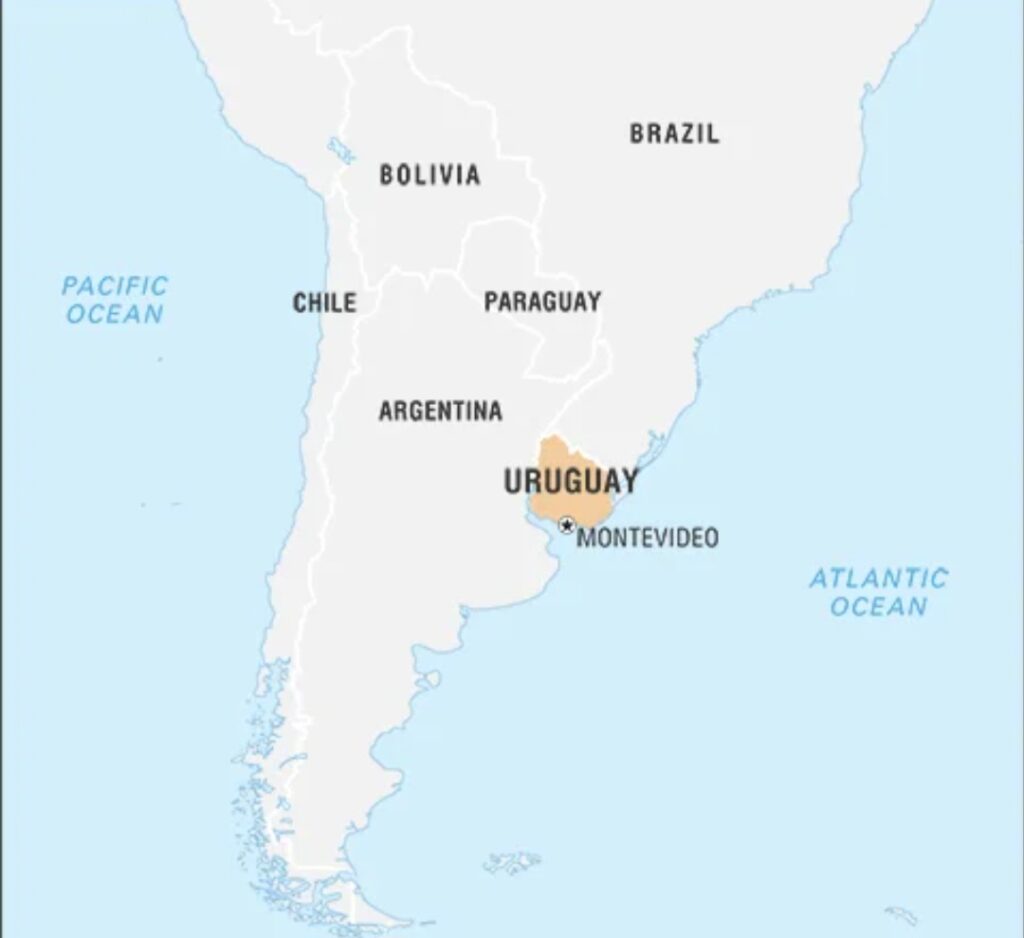By: Abhyuday Saraswat, Research Analyst, GSDN

The water crisis in Uruguay is a pressing issue that requires immediate attention by both the government and the international community. Due to the country’s geographical location, Uruguay faces a unique set of challenges in managing its water resources, which in turn has significant geopolitical implications. The stated water deficit is the result of a severe drought that has affected the whole country of Uruguay and is caused by a lack of rain. According to most sources, Montevideo’s present stocks of fresh potable water will last around 18 days under current conditions. According to authorities, Uruguay’s water shortage is the worst in 74 years. It is harming thousands of families and causing poor water quality.
Backdrop
Uruguay is situated in the La Plata basin, which is shared by Argentina, Brazil, Paraguay, and Uruguay. This region is prone to extreme weather events, including droughts, floods, and storms, which have a significant impact on water availability and quality. In recent years, Uruguay has experienced severe droughts, which have led to the depletion of its water resources, affecting both urban and rural areas. The situation is further exacerbated by climate change, which is expected to increase the frequency and intensity of extreme weather events.
Root problem
Two critical reservoirs in the nation have been drained to the point that salt levels are now more than double what the World Health Organisation recommends. As a result, the government has begun introducing salty water into the public water supply. As a result, Uruguay’s tap water has grown too salty to drink. The situation is critical, and residents have begun a search for subterranean water.
According to the state water provider Obras Sanitarias del Estado (OSE), water levels in the Paso Severino reservoir, which supplies more than half of Uruguay’s 3.5 million inhabitants, are at “historical lows,” at roughly 10% of capacity.
According to the most recent statistics, it contains around 6.2 million cubic metres of water, which is significantly less than the monthly average of 60 million. Every day, around 650,000 cubic metres are required to feed the capital.
Due to dwindling fresh water reserves in the country’s major reservoir, the public water corporation was compelled to mix supplies with water from the River Plate estuary in late April, resulting in extremely high levels of sodium and chlorides.
Geopolitical Implications
The water crisis in Uruguay has significant implications for the country’s geopolitical position. Uruguay is heavily dependent on hydropower, with over 80% of its electricity coming from hydroelectric plants. The depletion of water resources has had a severe impact on the country’s energy security, leading to power shortages and blackouts. This has not only affected the day-to-day lives of Uruguayans but has also had implications for the country’s economy, which is heavily reliant on energy-intensive industries such as agriculture and manufacturing.
This small, prosperous South American country is not alone in its suffering. Historically hot and dry temperatures are wreaking havoc on crops and rattling economies throughout the Southern Cone. In the face of global climate change, the area is warming faster than the rest of the world. Precipitation decreased to half the average over the latter four months of 2022, the lowest amount in 35 years.
Furthermore, the water crisis in Uruguay has implications for the country’s relations with its neighbours. As the La Plata basin is a shared resource, any actions taken by one country can have a significant impact on the others. For example, the construction of dams or other water infrastructure in Argentina or Brazil can affect the flow of water downstream, which in turn can affect Uruguay’s water resources. This has led to tensions between Uruguay and its neighbours, with disputes over water usage and management.
The issue is rampant in Barrio Nuevo Amanecer, Sosa’s neighbourhood on the outskirts of Montevideo. In a country where the drinking water is regarded as among the finest in the world, the expense of purchasing bottled water is straining family budgets.
Crisis Management
The Uruguayan water problem has had a variety of geopolitical ramifications. To address the water crisis in Uruguay, the government has taken a number of steps, including investing in water infrastructure, promoting water conservation, and encouraging the use of alternative energy sources. However, more needs to be done, both domestically and internationally, to ensure the sustainable management of water resources in Uruguay and the wider La Plata basin.
The government is currently subsidising bottled water in Montevideo and other cities after a three-year drought caused the South American country’s greatest drinking water crisis in at least a half-century. According to Public Health Minister Karina Rando, officials are recommending pregnant women and others suffering from certain chronic conditions avoid drinking tap water. The government declared that it will increase welfare payments for pregnant women, children, and the sick for 30 days in order for them to purchase two litres of bottled water each day.
The water crisis in Uruguay is a complex issue that requires a coordinated response from the government, civil society, and the international community. The crisis has significant geopolitical implications, affecting not only Uruguay but also its neighbours in the La Plata basin. To ensure the sustainable management of water resources in the region, it is essential that all stakeholders work together to develop innovative solutions that address the challenges posed by climate change and extreme weather events.
The situation has served as a wake-up call for Uruguayans, who are accustomed to hearing about water shortages on the worldwide news rather than on their doorstep. National elections will be held next year, and the crisis gives an opportunity for change. Given the present public uproar, water quality and conservation will be top-of-mind issues in the next elections, with political parties across the board under pressure to give real remedies.

